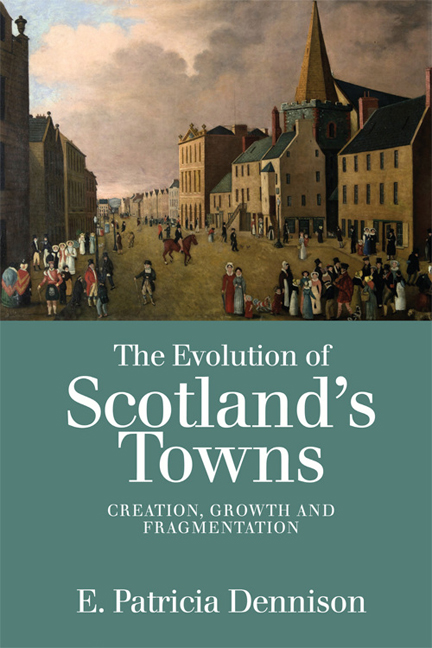Book contents
- Frontmatter
- Contents
- List of Figures
- Acknowledgements
- Image Credits
- List of Abbreviations
- Introduction
- 1 Medieval Towns
- 2 Daily Life in the Middle Ages
- 3 Medieval Faith and the Church
- 4 Encroachment on Burgh Society, 1550–1750
- 5 Man-made and Natural Disasters, 1550–1750
- 6 The Birth of Urban Scotland
- 7 The Victorian Town
- 8 The Twentieth Century
- Post-script: Footprints to Fragmentation
- Appendix: Population Statistics – A Select List
- Bibliography
- Index
4 - Encroachment on Burgh Society, 1550–1750
Published online by Cambridge University Press: 11 November 2020
- Frontmatter
- Contents
- List of Figures
- Acknowledgements
- Image Credits
- List of Abbreviations
- Introduction
- 1 Medieval Towns
- 2 Daily Life in the Middle Ages
- 3 Medieval Faith and the Church
- 4 Encroachment on Burgh Society, 1550–1750
- 5 Man-made and Natural Disasters, 1550–1750
- 6 The Birth of Urban Scotland
- 7 The Victorian Town
- 8 The Twentieth Century
- Post-script: Footprints to Fragmentation
- Appendix: Population Statistics – A Select List
- Bibliography
- Index
Summary
These two centuries could be categorised as the worst in the history of Scotland's towns. The calm that might have been hoped for after the Reformation crisis did not come. Towns were to experience destabilising of their long-assured positions and privileges with the rise of new, upstart burghs and markets. For some urban settlements, change was even more profound – they were cleared off their traditional sites, producing for many townspeople fear, misery and resentment, often against the local lairds who had masterminded the relocations to suit their own purposes. The equilibrium of urban society was further traumatised by man-made and natural catastrophes. These will be considered in Chapter 5: religious and political wars brought material and emotional hardship, and the forces of nature also seemed determined to undermine the stability of urban society.
New burghs, markets and shrinking hinterlands
These two centuries would see a proliferation of new burghs, a trend evident from the fifteenth century. In the period 1450 to 1516 three or four new royal burghs were created, along with almost seventy burghs of barony. Between 1550 and 1700 over 200 burghs of barony or regality appeared on the scene, often as a result of the persuasions of an ambitious landowner. In the years between 1660 and 1707 alone, no fewer than 109 were created, with only two new royal burghs appearing, and both of these were already baronial burghs (see Fig. 4.1). Most of these new creations were given the right to have craftsmen, a market each week and one or more annual fairs, so trampling to a greater or lesser degree on the economic rights of the older burghs. The revenues for these new burghs that came from market tolls, petty customs and the like were intended for the financial improvement of the burgh but were often sidelined for the personal benefit of the burgh superior. Significantly, the complaint at the Convention of Royal Burghs from Aberdeen about its provostship being monopolised by one family – the Menzies – likened its case to that of being ‘thrallit [oppressed] to serve ane raice of pepill, as it war ane burch of baronaye’.
- Type
- Chapter
- Information
- The Evolution of Scotland's TownsCreation, Growth and Fragmentation, pp. 110 - 137Publisher: Edinburgh University PressPrint publication year: 2017



